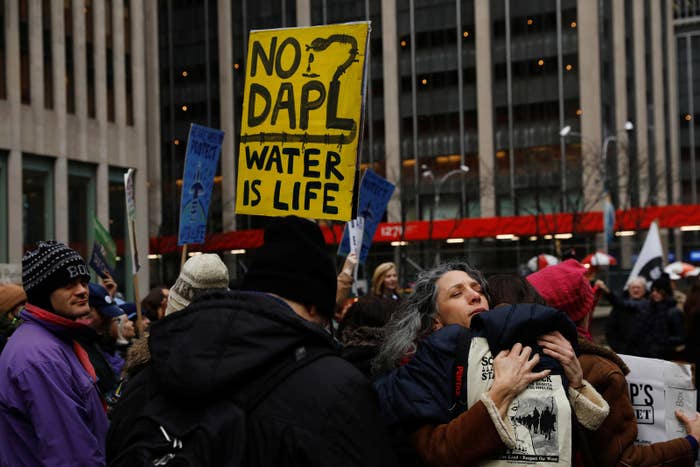
WASHINGTON — A federal judge in Washington, DC, on Monday denied a request to immediately stop construction of the Dakota Access pipeline.
An American Indian tribe challenging the pipeline raced to court last week after the US Army Corps of Engineers announced that it would grant the approvals needed for construction of the pipeline to continue through federal lands.
US District Judge James Boasberg heard arguments on Monday afternoon before a packed courtroom, and ruled from the bench that the Cheyenne River Sioux Tribe failed to show that it would suffer immediate, irreparable harm unless construction of the pipeline was halted right away.
The ruling doesn't end the challenge. The judge scheduled another hearing in the for Feb. 27 to hear arguments on the Cheyenne River Sioux Tribe's request for a preliminary injunction to stop the pipeline. Boasberg said he wanted to rule on that request before oil was actually flowing through the pipeline.
A lawyer for Dakota Access LLC, the company building the pipeline, offered a new, faster possible timeline for construction to finish. At a previous hearing, he said the company estimated it would take about 60 days to complete. On Monday, he said that there was no way to know for sure, but it could happen within 30 days, or even sooner, if construction proceeded at a certain pace.
Boasberg ordered Dakota Access to file a weekly update on the likely date that oil would begin flowing through the pipeline.
Although the Cheyenne River Sioux Tribe, along with the Standing Rock Sioux Tribe, have been challenging the pipeline since last year, arguments on Monday in the US District Court for the District of Columbia centered on a new argument that the Cheyenne River tribe raised in its latest court papers: that the pipeline would burden their exercise of religion, in violation of the federal Religious Freedom Restoration Act.
According to a lawyer for the tribe, the presence of oil would desecrate the waters of Lake Oahe, which the tribe uses in religious ceremonies. In filings and in court on Monday, attorney Nicole Ducheneaux said that the tribe believed the pipeline correlated with a black snake prophesied to bring destruction.
Construction on the pipeline halted in December, when the Obama administration said it wouldn't move forward with granting the easement. President Trump reversed course and signed an executive order last month calling for an expedited review of the project. The Army Corps of Engineers on Feb. 8 granted the approvals needed for construction to continue, in the form of an easement to go through federal lands.
Other legal challenges to the pipeline are proceeding before Boasberg. A lawyer for the Standing Rock Sioux Tribe said he planned to file papers this week seeking summary judgment on their claims, which are rooted in opposition to how the administrative process leading up to the granting of the easement played out. The Standing Rock tribe won't be pursuing a religious freedom argument in those papers, the lawyers said.
The Yankton Sioux Tribe, which has a separate case before Boasberg challenging the pipeline, filed papers on Monday saying it planned to resume briefing on an "expedited basis." And on Saturday, the Oglala Sioux Tribe filed a new lawsuit against the pipeline, which was also assigned to Boasberg.
A lawyer from the US Department of Justice indicated that it would prove difficult to keep up with some of the quick briefing schedules proposed by the tribes. Boasberg said he hoped that these cases were "high" on the government's list of litigation priorities.
UPDATE
This story was update with additional information about the judge's order.
